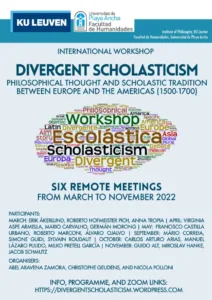A very common narrative in the history of both philosophy and science reconstructs the dawn of early-modern thought as a clean break from the dusk of Scholasticism and its Aristotelian roots. The workshop Divergent Scholasticism: Philosophical Thought and Scholastic Tradition between Europe and the Americas, 1500-1700 focuses on a different story. It is a story made of continuities and ruptures within late Scholasticism and nourished by refined theoretical elaboration and wide transmission of knowledge between the two shores of the Atlantic Ocean. Expanding from Europe (Leuven, Salamanca, and Coimbra) to Latin America and Asia, Second Scholasticism has received growing attention from scholarship only in recent decades. Organised by Abel Aravena Zamora, Christophe Geudens, and Nicola Polloni, the aim of Divergent Scholasticism is to foster a collaborative global network of interested scholars to better understand the specificities of such long-neglected debate.
Programme
11 March 2022
Opening keynote session
4 pm (Brussels) | 12 noon (Santiago del Chile)
- Erik Åkerlund, The King’s Power and the Power of the People: On a Conundrum in Suarez’s Political Philosophy
- Anna Tropia, Seeking for Jesuit Psychology: Mapping Manuscripts and Common Places from the College de Clermont (1564-1580)
- Roberto Hofmeister Pich, The Teaching of Logic in Latin American Scholasticism: Jeronimo Valera O.F.M. (1568-1625) and the Logic ad mentem Scoti
21 April 2022
4 pm (Brussels) | 10 am (Santiago del Chile)
- Virginia Aspe Armella, La fundación de la Real Universidad de México: su currículo y análisis de un caso
- Germán Morong, Flemáticos y sanguíneos; los indios y la circulación del saber médico en la Historia del Nuevo Mundo de Bernabé Cobo (1651)
- Mario Carvalho, How Divergent Was Latin-American Scholasticism? A still unanswerable question. Brazil, and Maranhão as a Methodological Case-Study
27 May 2022
4 pm (Brussels) | 10 am (Santiago del Chile)
- Francisco Castilla Urbano, La revisión gnoseológica del escolasticismo por el jesuita José de Acosta
- Álvaro Ojalvo, La circulación del cuerpo masculino hispano e indígena entre los saberes médicos, teológicos y jurídicos (España y América, siglos XVI y XVII)
- Roberto Marconi, Libertad académica y tradición en filosofía: Miguel de Viñas S.J., filósofo en Chile del siglo XVIII
7 October 2022
4 pm (Brussels) | 11 am (Santiago del Chile)
- Manuel Lázaro Pulido, Las razones del compartir. Fundamentos teológicos y filosóficos de la transmisión de conocimiento de los franciscanos a América
- Carlos Arturo Arias, Dictados sobre la justicia y el derecho: aulas y manuscritos neogranadinos
- Milko Pretell García, Logica Scholastica Barroca Peruviana: La recepción de la lógica y su desarrollo en la Academia limensis
24 November 2022
4 pm (Brussels) | 12 noon (Santiago del Chile)
- Jacob Schmutz, Seeing Clearly in a Confused Environment: Carmelite Philosophers in the Amazonian Forest
- Guido Alt, Logical Form and Consequence: John Mair and Domingo de Soto
- Miroslav Hanke, Termini naturales and Libelli sophistarum. British Physics Textbooks from around 1500
2 December 2022
4 pm (Brussels) | 12 noon (Santiago del Chile)
- Sylvain Roudaut, Pedro da Fonseca’s Theory of Modes: Its Sources and Influence
- Mário João Correia, Pedro Luis (1538-1602): A Forgotten Advocate of scientia media
- Simone Guidi, The Angelic Knowledge of the Future Singulars: Suárez and Poinsot
